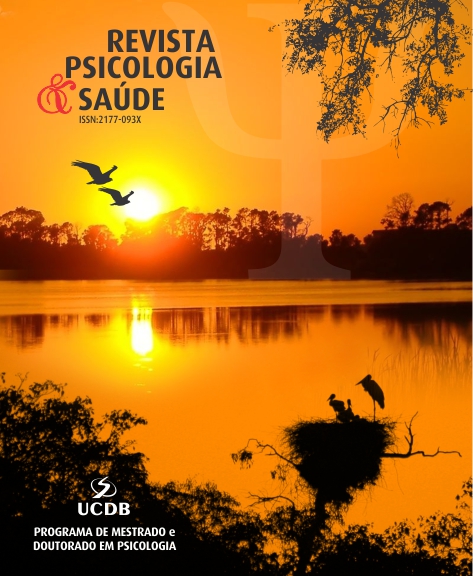“Changing the Game” Program (CTGP) – Overcoming: Psychosocial Intervention for Vulnerable Young People
DOI:
https://doi.org/10.20435/pssa.v1i1.2619Keywords:
youth, young people, epidemiology, innovation programs, social vulnerabilityAbstract
Objective: To describe the scope of Projeto Virando o Jogo – Programa Superação, based in Fortaleza, CE, and to analyze the profile of young people reached by the intervention project. Methodology: Descriptive study, with analysis of secondary data from JotForms platform, record of interventions carried out by psychologists and social workers, from 2020 to 2022. Interventions were based on the perspective of social psychology and social sciences. Results: A total of 1516 youth were seen and 444 groups, 413 home visits and 72 meetings with caregivers were conducted. The main reason for the psychosocial care was related to emotional disorders, with 171 records (depression+suicidal ideation+anxiety). Conclusion: Qualified listening for young people in large-scale programs provides an understanding of the most relevant problems that hinder their family and social relationships. Interventions with young people and family members in settings of social vulnerability are necessary to minimize internal conflicts and improve socioemotional pattern.
References
Álvarez, H. G. (2016). Young people who study in Chile (NINI): An Study of its Determinants. Thesis to opt for a Master's degree in Public Policy. University of Chile.
Araújo, I. A. A. (2020). Pedagogical Practices and Gender Studies: Valuing Diversity and Promoting a Culture of Peace (Dissertação de Mestrado em Psicologia, Centro Universitário de Brasília).
Balarezo López, G. (January-July, 2019). Generation of children: Young people who study or work. Paideia XXI, 9(1), 77–103. DOI: https://doi.org/10.31381/paideia.v9i1.2266
Barriga Clavijo, M. L., & Castillo Robayo, C. D. (2017). Young people who don't study or work in Colombia. Economy and Public Policies, 5(2), 59–92. https://sites.google.com/site/economiaepoliticaspublicas/n%C3%BAmeros-anteriores/v-5-2-2o-semestre-de-2017 .
Benjet C., Hernández-Montoya D., Borges G., Méndez E., Medina-Mora M. E., & Aguilar- Gaxiola S. (2012). Youth who neither study nor work: Mental health, education and employment. Salud Publica Mexico, 54, 410–417. DOI: https://doi.org/10.1590/S0036-36342012000400011
Brotfeld, C., & Berger, C. (2020). The role of empathy and openness in the intimacy of adolescent friendships. Revista de Psicología, 29(2), 26–39. https://www.scielo.cl/scielo.php?pid=S0719-05812020000200026&script=sci_abstract&tlng=en https://doi.org/10.5354/0719-0581.2020.52231 DOI: https://doi.org/10.5354/0719-0581.2020.52231
Cardoso, G., & Hermeto, A. (2021). Detailing the activity profile of Brazilian young people who do not study or work: The role of job seeking and household chores. Brazilian Journal of Population Studies, vol. 38, 1–20 https://www.scielo.br/j/rbepop/i/2021.v38/ https://doi.org/10.20947/S0102-3098a0164 DOI: https://doi.org/10.20947/S0102-3098a0164
Every Life Matters Committee, & ALECE. (2017). Every Life Matters Report.
Every Life Matters Committee, & ALECE. (2020). Every Life Matters Report.
De Paula, L. D., & Branco, A. U. (2022). Deconstructing prejudice in schools: The role of dialogical practices. Psychology Studies (Campinas), vol. 39, e200216. https://doi.org/10.1590/1982-0275202039e200216en DOI: https://doi.org/10.1590/1982-0275202039e200216en
Fundo das Nações Unidas para a Infância [UNICEF]. (2008). Strengthening family skills. https://www.unicef.org/brazil/fortalecimento-das-competencias-familiares
Gutiérrez García, R. A.; Martínez, K. I.; Pacheco Trejo, A. Y. (2014). Young people who don't study or work in Mexico. Enseñanza e Investigación en Psicología, 19(2), 1–12. https://www.redalyc.org/articulo.oa?id=29238007007
Harris, J. M., Ciorciari, J., & Gountas, J. (2019). Consumer neuroscience and digital/social media health/social cause advertisement effectiveness. Behavioral Sciences, 9(4), 42. https://doi.org/10.3390/bs9040042 DOI: https://doi.org/10.3390/bs9040042
Holanda M., K. (Org.) (2023). Child and adolescent mental health in public institutional contexts (1ª ed.). Graphic Expression and Publishing.
Instituto de Pesquisa e Estatística Econômica do Ceará. (2018). Quarterly youth bulletin. Government of the State of Ceará. www.ipece.ce.gov.br
Instituto de Pesquisa e Estatística Econômica do Ceará. (2021). Quarterly Youth Bulletin. Government of the State of Ceará. www.ipece.ce.gov.br
Martino-Bermúdez, M., & López, F. (2017). Young people who don't study or work in Uruguay. The experience of the Youth Program in Red. Revista Latinoamericana de Ciencias Sociales, Niñez y Juventud, 15(2), 861–876. https://doi.org/10.11600/1692715x.1520502032015 DOI: https://doi.org/10.11600/1692715x.1520502032015
Organização para Cooperação e Desenvolvimento Econômico. (2023). Education at a Glance 2023: OECD Indicators. https://doi.org/10.1787/e13bef63-en DOI: https://doi.org/10.1787/e13bef63-en
Pereira- Guizzo, C. S., Del Prette, A., Del Prette, Z. A. P., & Leme, V. B. R. (2018). Social skills program for teenagers in preparation for work. School and Educational Psychology, 22(3), 573–581. https://doi.org/10.1590/2175-35392018035449 DOI: https://doi.org/10.1590/2175-35392018035449
Piagentini, S., & Camargo, E. A. O. (2018). Neurosciences, Yoga and Education. Revista de Pós-Graduação Multidisciplinar – RPGM, 1(3), 237–250.
Instituto Brasileiro de Geografia e Estatística. (2022). Pesquisa Nacional por Amostra de Domicílios Contínua – PNAD-c.
Prefeitura de Fortaleza. (2010). Human development, by neighborhood, in Fortaleza. http://www.fortaleza.ce.gov.br/sde .
Rassial, J. J. (Org.). (2012). Children and adolescents: Enchantment and disenchantment (1ª ed.). Language Institute.
Rassial, J. J. (1997). The teenage passage. Arts and Crafts.
Rolim, M. (2018). Withdrawal from crime. Society and State, 33(3), 829–848. https://doi.org/10.1590/s0102-6992-201833030008 DOI: https://doi.org/10.1590/s0102-6992-201833030008
Salata, A. R., & Ribeiro, M. G. (1st Quarter 2022). Inequality in metropolises, 8. https://www.observatoriodasmetropoles.net.br/
Sánchez, R. M. (June, 2021). Young people who don't study in work (NINIS) in Colombia Youth not in Employment, Education or Training (NEET) in Colombia. Documents FCE-CID Escuela de Economía, No. 118.
Singla, D. R., Waqas, A., Hamdani, S. U., Suleman, N., Zafar, S. W., Zill Huma, Saeed, K., Servili, C., & Rahman, A. (2020). Implementation and effectiveness of adolescent life skills programs in low – and middle-income countries: A critical review and meta-analysis. Behavioral Research and Therapy, 130, 103402. https://doi.org/10.1016/j.brat.2019.04.010 DOI: https://doi.org/10.1016/j.brat.2019.04.010
Skeen, S., Laurenzi, C. A., Gordon, S. L., Du Toit, S., Tomlinson, M., Dua, T., Fleischmann, A., Kohl, K., Ross, D., Servili, C., Brand, A. S., Dowdall, N., Lund, C., Van der Westhuizen, C., Carvajal-Aguirre, L., De Carvalho, C. E., & Melendez-Torres, G. J. (2019). Adolescent mental health program components and behavioral risk reduction: A meta-analysis. Pediatrics, 144(2), e20183488. https://doi.org/10.1542/peds.2018-3488 DOI: https://doi.org/10.1542/peds.2018-3488
Taffarel, C. N. Z., & Beltrão, J. A. (2019). Destruction of productive forces and the downgrade of the working class: The case of the BNCC reform of secondary education. Germinal: Marxism and Education in Debate, 11(1), 103. https://doi.org/10.9771/gmed.v11i1.32000 DOI: https://doi.org/10.9771/gmed.v11i1.32000
Ziebold, C., Evans-Lacko, S., Andrade, M. C. R., Hoffmann, M. S., Fonseca, L., Barbosa, M. G., Pan, P. M., Miguel, E., Bressan, R. A., Rohde, L. A., Salum, G. A., De Jesus Mari, J., & Gadelha, A. (2022). Childhood individual and family modifiable risk factors for criminal conviction: A 7-year cohort study from Brazil. Scientific Reports, 12(1), 13381. https://doi.org/10.1038/s41598-022-13975-8 DOI: https://doi.org/10.1038/s41598-022-13975-8
Published
How to Cite
Issue
Section
License

This work is licensed under a Creative Commons Attribution 4.0 International License.
The articles published on journal Psicologia e Saúde holds the copyrights of all texts published by it. Due to that, there is a demand for a letter of copyright cession (see Appreciation). The full reproduction of any article of this Journal in other publications, by any means, requires a written authorization of the Editorial Board. Partial reproductions of articles (abstracts, more than 500 words of text, tables, pictures and other illustrations, sound files) should have the written permission of the Editorial Board and the Authors.












